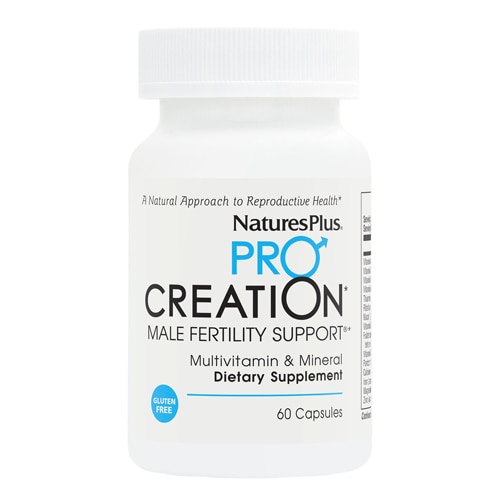[vc_row][vc_column][vc_column_text]When it comes to fertility, women tend to get all the attention. This is not too surprising, since women are the ones becoming pregnant and carrying the babies themselves. Yet let’s not forget that men are still responsible for half the equation when it comes to conception.
The hard truth is that infertility has been
on the rise in America for the past few decades.
So, it’s time to take a closer look at male fertility, and specifically, how diet influences it.

Is There a Diet to Improve Fertility in Males?
Research has shown that of all couples diagnosed with infertility, up to 50% of cases involve a male contributing factor. What’s more, sperm counts in men have been
rapidly declining, falling 50% in the past 50 years, and continuing to drop about 1% per year.
The causes behind this decline can include things like hormonal disorders, chronic illnesses, and testicular dysfunction. Yet more recently, unhealthy diet and lifestyle practices have been associated with male infertility and are thought to be a major contributor to declining sperm counts as well.
Emerging evidence has linked a man’s diet with his semen quality — including sperm count, its motility, and its size and shape. Male diet has also been linked to a lesser extent with clinical outcomes such as how long it takes a couple to become pregnant, and how many go on to have a live birth.
This declining semen quality, combined with the trend of couples
having children later in life means it is becoming harder and harder to conceive naturally. But changing your diet may help.
How to Optimize Your Diet to Improve Male Fertility
The Western diet — which is typically high in sugar and fat, unbalanced and provides excessive calories — has been a significant contributor to the rapid increases in obesity over the past several decades. And
studies show that obesity can have a significant effect on fertility by altering things like hormones and sperm function. But just because you may live in the West doesn’t mean you are subject to following the same dietary habits.
Contrary to the Western diet, which is a risk factor for male infertility, the
Mediterranean diet seems to protect against male infertility. If you’re wondering what this looks like in real life, here are some tips:
Pay attention to your fat sources.
Diets that are high in
saturated fats negatively affect sperm quality, while unsaturated fats improve it. Foods high in saturated fats include many animal foods like red meat, full fat dairy products, and some oils like palm and coconut oil. Sources of unsaturated fat include foods like nuts, olive oil, and avocados.
Studies report that omega-3 fats — a type of unsaturated fat — are particularly good for improving sperm quality by reducing oxidative damage, or damage to your body’s cells. Some food sources of
omega-3’s include salmon, walnuts, and flaxseeds.
Load up on antioxidants.
Antioxidants are nutrients that help protect your body’s cells from damage by free radicals. More
antioxidants are linked to higher sperm counts, and have been shown to be effective in the treatment and/or prevention of male infertility. Foods and beverages rich in antioxidants include colorful fruits and vegetables, cocoa beans and coffee.
Avoid highly processed meats.
Highly
processed meats — like bacon, sausages and salami — have a
harmful effect on fertility, not to mention other aspects of your health. The cause may come from factors such as its high content of saturated fat and the presence of preservatives. What’s more, processed red meat has been found to contain hormone residues that may negatively affect the body’s endocrine system, while unprocessed meat does not.
Cut back on added sugars.
High intakes of
added sugar — especially from soft drinks — contribute to a
decline in sperm concentration. Foods examples that are high in added sugar include many breakfast cereals, desserts and flavored yogurts or other snack foods. Note that natural sugars — such as those present in fruit and dairy — are not shown to be harmful to sperm.
Limit your alcohol intake.
Alcohol has been shown to negatively affect semen volume and reproductive hormones. What’s more, alcohol weakens the body’s antioxidant defenses, which can lead to
oxidative stress — a condition that occurs when too many free radicals build up. Each of these factors, in turn, negatively impact male fertility. While the occasional drink in moderation likely isn’t going to cause much harm, excessive or frequent consumption can really take a toll.
Note that in addition to diet, other factors such as excessive exercise, substance use and high blood pressure can also negatively impact fertility in both males and females. Non-modifiable factors like age and genetics can also play a role.
All in all,
studies show that a diet that is high in fish and healthy fats and low in sugary drinks and processed meats may improve male fertility. Gradually losing weight may also help improve many
fertility issues in men, including reproductive hormone levels, better semen quality and sperm count.
In Summary
Male fertility is a big issue in America. Sperm counts have been steadily declining over many years, and men are responsible for up to half of the cases of infertility. While some of these contributing factors are non-modifiable, diet plays a large role, which can be changed. Consuming high amounts of antioxidants and healthy unsaturated fats, such as from fish, are shown to help improve male fertility. On the other hand, frequently eating highly processed red meats, sugary beverages, and alcohol can worsen fertility health. For men who are obese, gradually losing weight can also lead to improved fertility metrics. Couples who are dealing with fertility issues should have both partners evaluated by a doctor, and can work towards making small yet impactful changes to their diets where indicated.[/vc_column_text][/vc_column][/vc_row][vc_row][vc_column][vc_text_separator title="Featured Products" border_width="2"][vc_row_inner equal_height="yes" content_placement="middle" gap="35"][vc_column_inner width="1/3"][vc_single_image image="188141" img_size="full" alignment="center" onclick="custom_link" img_link_target="_blank" css=".vc_custom_1758476167142{padding-right: 7% !important;padding-left: 7% !important;}" link="https://www.vitacost.com/vitacost-certified-organic-walnuts-halves-pieces-non-gmo-kosher"][/vc_column_inner][vc_column_inner width="1/3"][vc_single_image image="188140" img_size="full" alignment="center" onclick="custom_link" img_link_target="_blank" css=".vc_custom_1758476178750{padding-right: 7% !important;padding-left: 7% !important;}" link="https://www.vitacost.com/taza-chocolate-organic-dark-chocolate-bar-stone-ground"][/vc_column_inner][vc_column_inner width="1/3"][vc_single_image image="188139" img_size="full" alignment="center" onclick="custom_link" img_link_target="_blank" css=".vc_custom_1758476189847{padding-right: 7% !important;padding-left: 7% !important;}" link="https://www.vitacost.com/antioxidant-solutions-non-gmo-juice-tart-cherry-with-splash-of-apple"][/vc_column_inner][/vc_row_inner][/vc_column][/vc_row]




